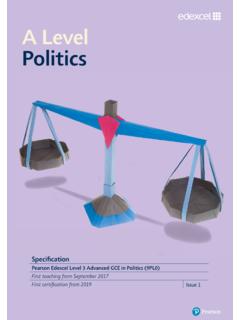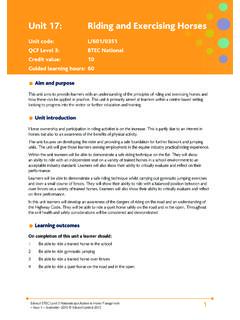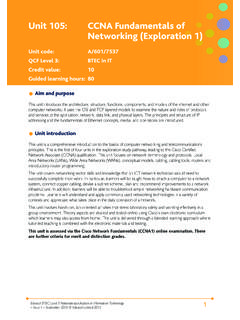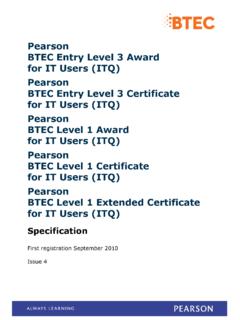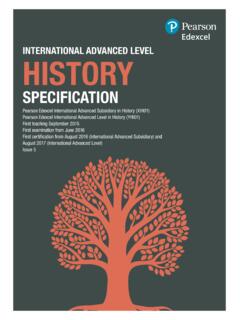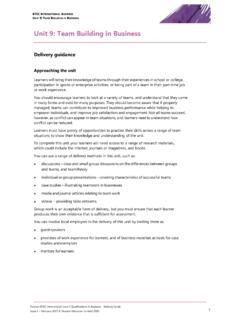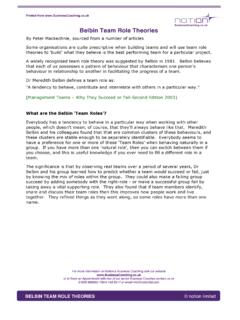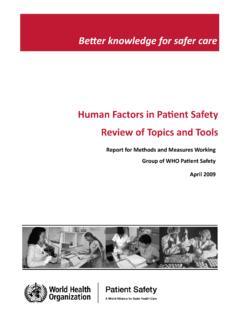Transcription of Unit 49: Contribute to the Effectiveness of Teams in Care ...
1 Unit 49: Contribute to the Effectiveness of Teams in Care Settings Unit reference number: M/616/7354. Level: 2. Unit type: Optional Credit value: 3. Guided learning hours: 20. Unit summary The ability to work confidently with others as part of a team is a core element of working in care settings. Working well in Teams is a skill set its own right. It requires the working collaboratively with others. This unit gives you an introduction to the skills and knowledge needed to ensure that you will be able to Contribute to team Effectiveness . You will look at time management, legislation and work policies. In this unit, you will develop the basic skills you need to be an effective team player and to positively Contribute to working with others in care settings. You will learn about the purpose and objectives of team working and how legislation guides the way you work with others. You will develop your skills by reflecting on your own and others' work performance so that you can identify what you need to do to work towards intended goals.
2 You will review the skills you already have and explore what other skills you might need to carry out your role when working as part of a team . You will then demonstrate the ways you work effectively with other team members. By the end of this unit, you will be able to demonstrate your ability to work as part of a team to collaborate towards meeting team objectives. 978 1 446 95316 7 Pearson BTEC Level 2 Diploma in Care (England) 1. Unit Issue 1 January 2018 Pearson Education Limited 2018. Learning outcomes and assessment criteria To pass this unit, the learner needs to demonstrate that they can meet all the learning outcomes for the unit. The assessment criteria outline the requirements the learner is expected to meet to achieve the unit. Learning outcomes Assessment criteria 1 Understand the importance of own Describe the team 's overall role and how it contributes to the objectives and purpose team performance within a care Explain how own role and setting responsibilities Contribute to team activities, objectives and purposes Identify other team members.
3 Their roles and responsibilities within the care team Explain their activities and ideas to other members in the care team 2 Be able to reflect on own Use feedback or suggestions from performance others to enable them to improve own practice within the care team Propose suggestions or ideas to benefit team members and improve team working Undertake development and learning to interact with the care team more effectively 3 Be able to manage time and Fulfil own commitments to other commitments effectively team members within agreed timescales and according to overall work priorities Inform appropriate care team members when commitments cannot be fulfilled within specified timescales 4 Be able to establish effective Behave towards other care team working relationships with all members in a way that supports members of the care team the effective functioning of the care setting Resolve differences of opinion and conflicts within the care team in ways that respects other's points of view 2 978 1 446 95316 7 Pearson BTEC Level 2 Diploma in Care (England).
4 Unit Issue 1 January 2018 Pearson Education Limited 2018. Content What needs to be learned Learning outcome 1: Understand the importance of own role and how it contributes to the team performance within a care setting Objectives and purpose of team working Purpose and objectives of team working: o increases ability for problem solving, planning, decision making o improves productivity o maintains and improves quality of practice and provision o allows for collaboration, collective decision making o avoids ambiguity (misinterpretation, conflicts). o encourages innovation, motivation, morale (draws on individual strengths of team member). o ensures health, safety and wellbeing of team and others. o encourages trust, sense of common purpose o engenders positive perception of the setting from others, improved reputation, outcomes on inspection, marketing. Achieving organisational goals (through forming, storming, norming).
5 Principles governing team working (legislation): o legislative frameworks guiding working practice, equality, diversity, discrimination and rights o local and organisational policies, procedures and practice. roles and responsibilities for good team working belbin 's team role model to define own skills: o shapers o implementers o completer finishers o co-ordinators o team workers o resource investigators o plants o monitor evaluators o specialists. Own role and responsibilities within Teams : o formal roles , responsibilities, specific tasks undertaken o informal roles , assumed responsibilities (comedian, caretaker, catalyst, optimist). o position within team , leader, follower o role within team , facilitator, supporting other team members. Others' roles and responsibilities: o formal roles , responsibilities, specific tasks undertaken o informal roles , assumed responsibilities (comedian, caretaker, catalyst, optimist).
6 O position within team , leader, follower o role within team , facilitator, supporting another team member/s. 978 1 446 95316 7 Pearson BTEC Level 2 Diploma in Care (England) 3. Unit Issue 1 January 2018 Pearson Education Limited 2018. What needs to be learned Sharing with others Ideas: o development of practice or provision o ways of working o knowledge from training, own research, experience o legislative and organisational frameworks. Sharing ideas: o formally through knowledge exchange training o developing information booklets o using different forms of communication, face to face, IT, posters. Learning outcome 2: Be able to reflect on own performance Using feedback from others to improve own performance Types of feedback: o formal, appraisals, one-to-one meetings o informal, discussions with colleagues, feedback from individuals o self-reflection, 360-degree reflection. Developing feedback: o responding to feedback o identifying strengths and areas for development, SWOT.
7 O identifying training and support to develop own performance. Provide suggestions to improve team working Use evidence from own practice to provide suggestions to: o improve support between team members o improve quality of practice or provision o identify team roles and responsibilities. Develop own practice to improve team working skills and knowledge Developing performance: o developing objectives and setting deadlines to improve own performance, SMART targets o reflecting on own development over time. 4 978 1 446 95316 7 Pearson BTEC Level 2 Diploma in Care (England). Unit Issue 1 January 2018 Pearson Education Limited 2018. What needs to be learned Learning outcome 3: Be able to manage time and commitments effectively Meeting deadlines Identifying own tasks and prioritise in order of importance. Setting achievable timelines. Identifying contingencies, interruptions, holiday, illness, other duties.
8 Identifying appropriate support when needed, human or physical resources. Identifying potential impacts on managing time and commitments, on individuals, colleagues, own performance: o limit multitasking. Managing contingencies Reporting to others when deadlines/commitments cannot be met: o colleagues o line managers o ways to inform others, formally, informally o acknowledge and report inability to meet commitments o identify ways to change way of work o reporting in timely manner, do not wait. 978 1 446 95316 7 Pearson BTEC Level 2 Diploma in Care (England) 5. Unit Issue 1 January 2018 Pearson Education Limited 2018. What needs to be learned Learning outcome 4: Be able to establish effective working relationships with all members of the care team Behaviour that promotes effective team working Skills required to carry out own roles and responsibilities: o following agreed ways of working o own roles and responsibilities in practice o timekeeping skills, punctuality, informing others when unable to attend work o positive attitude o adaptable (willingness to change).
9 O supportive o demonstrate respect, empathy, equality, diversity and inclusion o ability to communicate to different people in different contexts o self-reflective o adaptability (willingness to manage change). Resolving conflict (in a way that respects others' points of view). Types of conflict: o personal, about self-image, loyalty, confidence, issues of respect o conflicts of interest, reaching consensus for a goal o instrumental conflict, over objectives, goals, agreed ways of working. Demonstrate appropriate ways to respond to conflict: o actively listen to others o remain calm and acknowledge that the situation exists o remain neutral, consider another person's perspective o be open and flexible o define the problems o let others express feelings o ask for opinions and justifications on issues o demonstrate appropriate non-verbal forms of communication, eye contact, facial and hand gestures, body language o find common areas of agreement o find collaborative solutions o determine follow up o what to do if conflict is unresolved, mediation, support from line managers.
10 6 978 1 446 95316 7 Pearson BTEC Level 2 Diploma in Care (England). Unit Issue 1 January 2018 Pearson Education Limited 2018. Information for tutors Suggested resources Book Peate, I Fundamentals of Care: A Textbook for Health and Social Care Assistants (Wiley-Blackwell, 2017) ISBN 9781119212201. Websites Learning and development resources for working practice. Website for current government legislation. Social Care Institute for Excellence Skills for Care Care Standards 978 1 446 95316 7 Pearson BTEC Level 2 Diploma in Care (England) 7. Unit Issue 1 January 2018 Pearson Education Limited 2018. Assessment This guidance should be read in conjunction with the associated qualification specification for this unit. This unit is internally assessed. To pass this unit, the evidence that the learner presents for assessment must demonstrate that they have met the required standard specified in the learning outcomes and assessment criteria, and the requirements of the assessment strategy.
